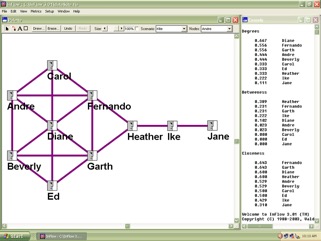Mapping Human Relationships2

We (Amy and I), in our Mastering Projects Workshop, have found it essential to focus upon some form of relationship mapping BEFORE creating any task plan or even the roles and responsibility exposition, because acknowledging existing relationships can help create a plan that works with what's there. This can also head off some inevitable collisions.
We always find some busted relationship in the mapping, someone in the community who has the power to take another's lunch money without even intending to. Learning how to better cope with these subtly powerful people in our relationships adds a lot of potential to the person and to the project. Creating a task plan without acknowledging these powerful networks seems theoretical; not well grounded in reality.
Of course, these maps are no less notional than any task network, but they seem to carry deeper personal meaning. (Note that everyone, always, already carries an implicit relationship map around inside them. This activity merely moves what might have been only implicit onto more explicit ground.) We guide each participant in creating their personal map of their relationships, and never insist that these be shared or distilled into a single, comprehensive model. These are information, not definition. How I see you is not how you are, but a representation of how I see. How I cope with what I see is more important than agreeing that what I see defines anyone else's reality. Also, announcing that I characterize you as a jerk on my relationship map won't improve our relationship. This is personal information.
We focus upon what we call 'high-cost relationships.' Ones where we aspire for the relationship to be different than it seems to be. Where, for instance, we feel we need a committed relationship, but experience an indifferent one. Or where someone with an invariably different perspective has the power to say, "No!" and make it stick. Then we work through a little safe role-playing, where individuals get the opportunity, with a supportive coach on hand, to engage with their nemesis. The results are usually surprising. Whether the objective of the conversation is met or not, a deeper understanding of how that relationship might work results. Oh, and the one initiating the relationship usually learns how useful it is to have a coach.
I believe that in the future, most project "planning" will incorporate these techniques, and the explicit exposition of social networks will be recognized as an equal, perhaps greater contributor to project success. If the plan doesn't acknowledge informal relationships, focusing only upon formally-assigned roles and responsibilities, looking at formally-declared tasks as the premise for getting stuff done, the project can't work. Can it? When the plan falls apart, these networks kick in to actually get stuff done, whatever the plan might say.
This is a high-level outline of one of the key elements of creating a project community. More in later posts ...


